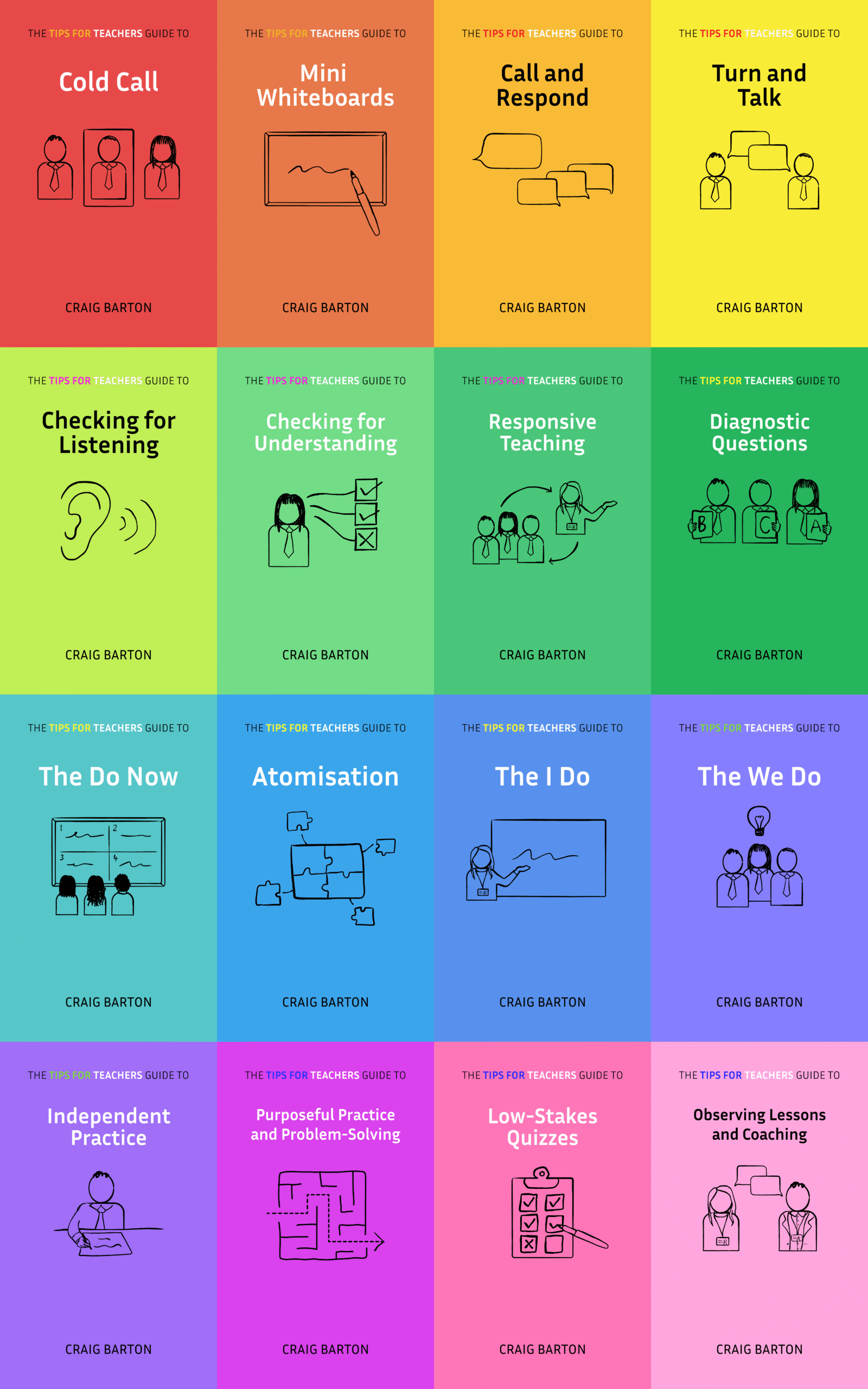I write not one, but two, free weekly newsletters.
Tips for Teachers newsletter
Each Monday morning (7am BST) the Tips for Teachers newsletter lands in your inbox. It contains:
- A tip to try out in lessons that week
- A video to discuss with a colleague
- A podcast episode to listen to on your way home
You can find past editions below and sign up by putting your email address in the box at the bottom of this page.
- #1 Make use of both sides of a mini-whiteboard
- #2 Ban the word “easy”
- #3 Try students standing during explanations
- #4 Check students have heard you instructions
- #5 Cold Call a student twice in a lesson
- #6 How to choose which pair of students to call upon
- #7 Include upcoming prerequisite knowledge in homeworks
- #8 Ask pupils “what was the most useful thing I did today?”
- #9 How to respond to “I don’t know”
- #10 Lower the content demand initially when introducing a new routine
- #11 Getting even more out of Diagnostic questions
- #12 Introducing Call and Response
- #13 Two questions to write when planning a lesson
- #14 The four steps of Responsive teaching
- #15 Coaching: the hypothesis and critical evidence combo
- #16 The importance of Wait time 1
- #17 The importance of Wait time 2
- #18 What is the optimal group size?
- #19 Ask me two questions
- #20 Improving revision lessons
- #21 Two tips to improve whole-class feedback
- #22 Ask students to respond in sentences
- #23 The power of waiting for Golden Silence
- #24 Reducing the tactical delay with voting cards
- #25 Ask students to Copy worked examples later in the lesson
- #26 Use mini-whiteboard when going through tests
- #27 What to say to high-achieving students if they are bored
- #28 Model in real-time
- #29 Three questions to ask during a departmental meeting
- #30 Add confidence scores to mini-whiteboards
- #31 Three videos, podcasts, tips and blogs posts to check out
- #32 “Head down, fist on head” for answering diagnostic questions
- #33 Carry a mini-whiteboard with you when circulating
- #34 Explain, Frame, Reframe, Rehearse when doing Call and Respond
- #35 Beware of saying “If you got the question wrong, make sure you have corrected it”
- #36 Use Call and Respond to check calculator use
- #37 The score you get is when you make your first mistake
- #38 Step away from the board when modelling
- #39 Follow tumbleweed with a Turn and Talk
- #40 Don’t make hints unavoidable
- #41 How to make Call and Respond (even more) fun
- #42 Don’t clean your mini-whiteboard!
- #43 Ask the easiest question first
- #44 Use the Instruction Sandwich to improve how you give instructions
- #45 Reveal answers one at a time to direct focus
- #46 Explain, Condense, Unpack
- #47 Can you get us started…
- #48 Check for listening to see if your explanation is clear and concise
- #49 Play the “Does that make sense?” game
- #50 When using multiple-choice questions, remove the options initially
- #51 Try a new idea with one class, for one week
- #52 Introduce checks for listening using non-subject content
- #53 Ask students to put their mini-whiteboards together
- #54 Ask students not to say or write anything for 30 seconds
- #55 Hide your tell when calling upon students to explain their thinking
- #56 Try these four different ways of going through the answers
Eedi newsletter
My Eedi newsletter comes out every Tuesday. Typically, this contains longer-form content, focussing on coaching, classroom pedagogy and resources. Again, you can find past editions below and sign up by putting your email address in the box at the bottom of this page.
Coaching
- My Coaching Process
- Coaching Case Studies #1: Improving the Do Now and explanations
- Coaching Case Studies #2: Improving worked examples and check for understanding
- Coaching Case Studies #3: Misconceptions and going through tests
- Coaching Case Studies #4: Non-examples and room layout
- The power of the Hypothesis Model when coaching
- The importance of rehearsal when coaching
Departmental support
- Developing a departmental approach to the Do Now
- Developing a departmental approach to worked examples
- Developing a departmental approach to reviewing answers
- Developing a departmental approach to problem-solving
High-value activity structures
- Venn Diagrams: 10 tips to supercharge them in the classroom
- SSDD Problems: 10 tips to supercharge them in the classroom
- Intelligent Practice: 10 tips to supercharge it in the classroom
- A little bit of problem-solving in every lesson: 10 tips to make it happen
Pedagogy
- Two ideas for improving GCSE revision
- The myth of copying things down
- Busy tricking during the Do Now
- Supercharging Think, Pair, Share
- The cost of classroom interruptions
- How many of your students are participating?
- Participation ratio in lessons: the results are in!
- Boosting the participation ratio during our explanations
- How prescriptive should a Head of Department be?
- Book-to-Board: One of my favourite uses of mini-whiteboards
- Pitfalls to avoid when going through answers
- Mini-whiteboard + Exam paper = ❤️
- 13 ideas to help boost homework completion rates
- The perils of Rounding Up students’ answers
- Helping students listen to each other
- The opportunity cost of digging deeper
- 10 things we know about testing
- Correcting in green pen does not work
- Poor proxies for understanding
- Poor proxies for listening
- How to think about new ideas
- Seven ways to use diagnostic questions to check for understanding
Resources
- Variation spiders!
- GCSE Big 20
- The best maths worksheet ever?
- Free maths CPD
- Back to school: Four things to listen to
- Brand-new, free maths resources for every maths topic
- Explain the mistake
- Free quizzes, videos, fluency practice, problem solving questions and more
3-Read Friday
- Coaching expectations, consistency and worked examples
- Attention, revision mistakes, and seminal studies
- Explanations, confidence, and productive struggle
- Efficiency, observations, and ChatGTP
- Teach like nobody’s watching, 1% better, and angles
- Participation ratio, Go-to guides, and success
- Time, planning, and mathematical literacy
- Problem-solving, self-explanation, and 3 Acts
- Maths resources, action bias, and fun lessons
- Homework, highlighting, and angles
- Pre-testing, quizzes, and if-then statements
- Variation Theory, lesson planning, and subject knowledge
- Questions, sense, and chatbots
- Variation Theory, mobile phones, and CPD
- Thinking time, One Note, and group coaching
- Improving teaching, QLAs, and product of prime factors
- Klaxons, checks for listening, and the first 10 minutes of a lesson
- Skills v knowledge, live coaching, and conceptual understanding
- Experience, worksheets, and Christmas!
- Wrong answers, 100%, and unintended consequences
- PISA, ChatGPT, and mobile phones
- Hypercorrection, textbooks, and praise
- Pace, productive struggle, and free maths resources
- MCQs, belonging, and attention
- Stepping away from the speaker, messy markbooks, and GCSE Maths revision
- Feedback, inclusive classrooms, and more feedback!
- Calling out, fixing the Do Now, and multi-tasking
- Improving teaching, student absence, and tageting indicators
- Worked examples, SEND, and AI tutors
- Rehearsal, assessments, and naked explanations
- Stories, attention, and maths gems








